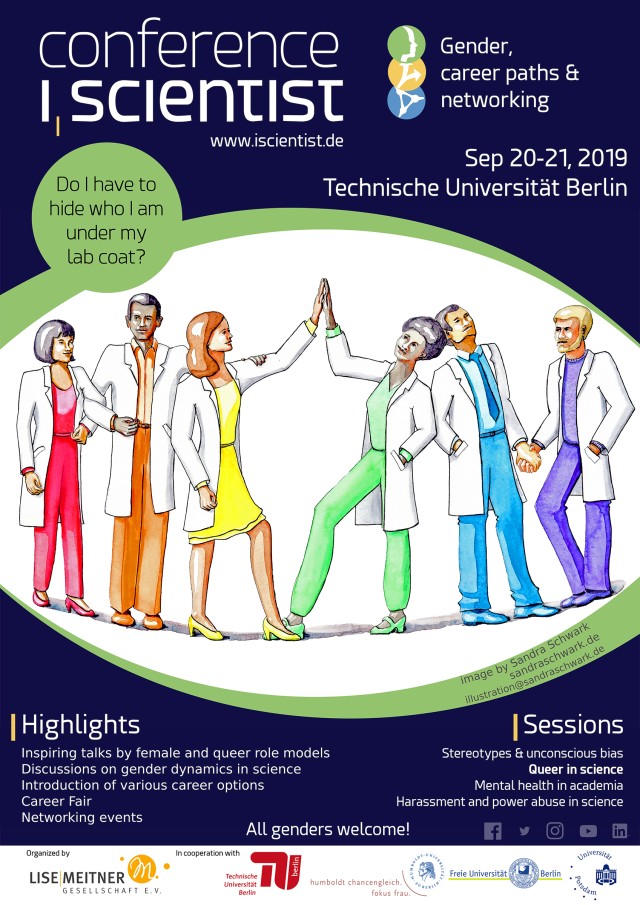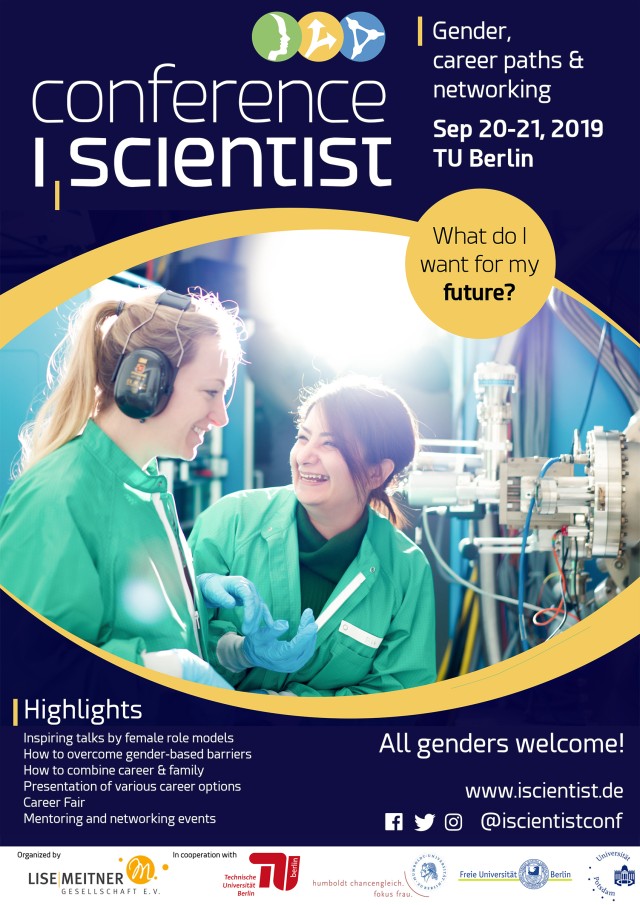Karen Wintersperger, PhD student in Prof. Bloch's group at LMU, shares her insights from attending the I,Scientist conference. The event took place in September 2019 in Berlin and is focused on gender, different career paths in academia, and networking with peers, mentors, and experts.
Conference I,Scientist Berlin
In September 2019 the conference I, Scientist about gender, different career paths in academia and networking took place at TU Berlin.
There is an obvious gender imbalance in academia, especially in the fields of Science, Technology, Engineering and Math (STEM), which was addressed by this conference. It aimed to increase the awareness of structural inequalities that have led to this imbalance but also to provide support and mentorship opportunities to young scientists and to synthesize ideas for changes that will lead to a better and more inclusive future.
The conference, which started on Friday, 20th provided a diverse program including plenary sessions, a career fair, networking events and discussion sessions. The organizers promoted a very relaxed and open atmosphere, encouraging people to communicate and to join groups. In that context I got to know the “Pac-man rule”, which can be very useful e.g. for poster sessions [1]. In contrast to other (purely scientific) conferences that I had attended before, the majority of the participants here was female (about 70%) working mainly in physics, biology, math, computer science, psychology and medicine. I had the impression that most of the people attending the conference were already quite aware of gender- and diversity-related issues and it was very inspiring to discuss and exchange ideas with them. The conference provided a great platform to share my experiences with other female scientists, realizing that many struggles I have are not just individual but connected.
The plenary talks were dedicated to four mayor topics being Stereotypes and unconscious bias, Mental health in academia, Power abuse and harassment in science and Queer in science. In general, there were two different kinds of presentations: in the first one, the speakers reported on their current research in a STEM field, but also told about their personal experiences with being transgender, queer, homo- or bisexual and working in academia. The second kind of talks was given by experts from psychology or social sciences conducting research about gender and diversity, discrimination and harassment, or mental health in the academic context. These different kinds of presentations complemented one another quite well. It was very touching to hear people sharing their stories and showing that you can be a great scientist no matter which gender you have or where you come from.
Another highly discussed issue was how to improve the situation of PhD students in general, especially the relation with their supervisors. Unfortunately, in almost all subjects represented at the conference, many of the PhD supervisors seem to lack some leadership skills. Among the ideas to change this were mandatory trainings, but also small things like giving the students a little positive feedback from time to time.
On Friday afternoon, the career fair took place. Representatives of several companies and research institutions had built up stands to introduce the conference attendees to career paths available after graduating and to show more about opportunities beyond academia. After another plenary session, the first day ended with an “Icebreaker event” - an informal get-together with food and drinks, providing a nice opportunity to meet new people.
Saturday started with a networking breakfast themed “meet the expert”: there were about 15 tables with experts of different topics, informing about career options in science management, science communication, banking, consulting or patent attorney or discussing more personal questions like having children as a PhD student or postdoc, or how it is like to work in engineering as a woman. The conference participants could choose any of the topics and discuss in small groups with the different experts and with each other.
The program continued with two more plenary sessions followed by the discussion sessions in the afternoon. These were dedicated to personal experiences, discussing e.g. about how to combine a family with an academic career, gender in the workplace or whether to stay in academia or not. In total, there were five topics being discussed in large groups, which were divided into subgroups. In each subgroup, we tried to answer different questions related to the topic. Afterwards, all results were discussed with the whole group.
The event ended with a dinner on Saturday evening, being open to all participants. In general, the conference provided a good balance of plenary talks and interactive sessions as well as of sharing personal experience and discussing general problems. I can strongly recommend it to everyone being interested in the people behind the science [2].
[1]
The Pac-Man Rule at Conferences
[2]
I,Scientist 2020
MCQST supported Karen's attendance to the I,Scientist conference.
If you would like to attend the next edition or other conferences on similar topics, contact the
MCQST Office to apply for fiancial support.

